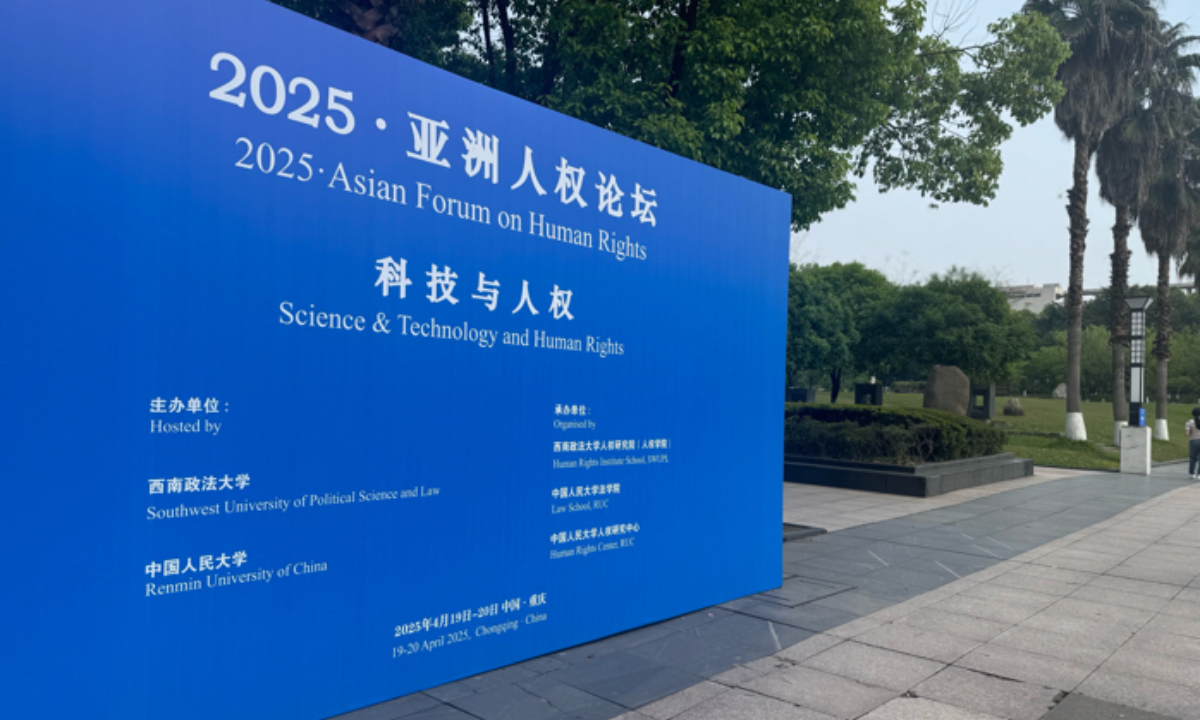
2025 Asian Forum on Human Rights kicks off in Southwest China’s Chongqing on April 19, 2025. Photo: Liu Caiyu/GT
Human rights scholars at a forum in Chongqing, Southwest China, on Saturday adopted a joint consensus, agreeing that technology must be fundamentally oriented towards the protection of human rights. They expressed strong opposition to the infringement of human rights, perpetrated by certain countries through technological blockades.
The 2025 Asian Forum on Human Rights, themed on science & technology, and human rights, brought together nearly 60 human rights scholars from China and abroad to explore how advancements in science and technology can be aligned with the promotion and protection of human rights in Asia. The forum was organized by Southwest University of Political Science and Law and Renmin University of China.
Scholars attending the forum affirmed that technology must be fundamentally oriented toward protecting human rights. With the aim of achieving substantive equality, it is imperative to prevent and eliminate discrimination that may be intensified by scientific and technological advancements.
They said that Asia needs to lead regional cooperation on human rights issues in emerging technologies. “It is imperative to address emerging concerns such as algorithmic discrimination, cross-border data flows, and sovereignty disputes within the Asian context,” it read.
Addressing the forum, Jiang Jianguo, member of the Standing Committee and deputy director of the Ethnic and Religious Affairs Committee of the National Committee of the Chinese People's Political Consultative Conference and executive vice president of China Society for Human Rights Studies, said that the human rights positions, values, concepts, and practices of various Asian countries resonate with each other. He emphasized the need to leverage technology to advance human rights and safeguard the promising development of the Asian region.
Jiang noted that Asia has become both a driving force and stabilizer for global development. He noted that over the past few decades, Asian nations have forged an independent and self-reliant path to development through diligent labor and creativity. Currently, Asia accounts for around 60 percent of the global population and contributes over 60 percent to global economic growth, leading in fields such as AI, quantum computing, advanced medical technology, and green energy.
Forum attendees also rejected technological hegemony in all its forms and rejected the use of security as a pretext for technological blockades and unilateral sanctions, according to the consensus.
Zamir Ahmaed Awan, deputy director of Center for Chinese Studies of Pakistan National University of Science and Technology, told the Global Times, some certain countries’ restricting other countries to utilize the technology to develop is an obvious case of human rights violation.
He stated that the US has politicized the issue of human rights, despite portraying itself as a staunch defender of such values. “Human rights should not be used as a tool or weapon against others,” Awan emphasized.
Jiang criticized certain countries for embracing the doctrine of “power makes right,” disregarding international norms and abandoning moral principles in their pursuit of hegemony.
“By forcing the world to subsidize their dominance, certain countries impose so-called "reciprocal tariffs," openly engaging in global financial plunder. This is nothing short of an arrogant trampling of every nation’s right to development,” Jiang said.
In response to technological blockades and unilateral sanctions, Jiang called for “technology for good” to serve as the guiding principle in advancing human society. He urged open collaboration to meet the human rights challenges of the digital era.
Liu Hongzhen, a professor of Faculty of Law of Jilin University, Deputy Dean of Human Rights Institute, proposed “integrating human rights into technology.”
Liu told the Global Times that “when we talk about integration, we mean using human rights to serve a particular perspective in taming technology. Without a human rights perspective to guide this process, technology can easily become a force that oppresses individuals, violates human dignity, and worsens social inequality.”
Harnessing human rights to regulate technological competition can promote reform in global technology governance, Liu added.
Liu proposed several measures, including promoting knowledge sharing and technological assistance from developed nations, reduce restrictions on technology transfer, and enhance capacity building in developing and emerging nations.
The forum’s consensus also advocated promoting multilateral dialogue under the auspices of the UN to strengthen international human rights mechanism.
It called for reforming the global intellectual property system to balance incentives for innovation with equitable access to public goods, and to support digital capacity-building in less developed regions.


